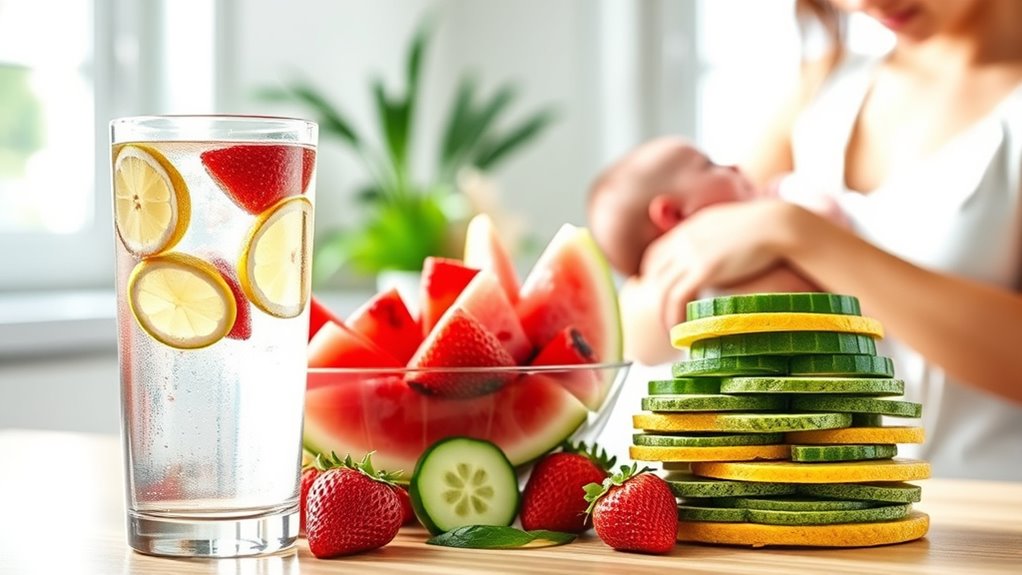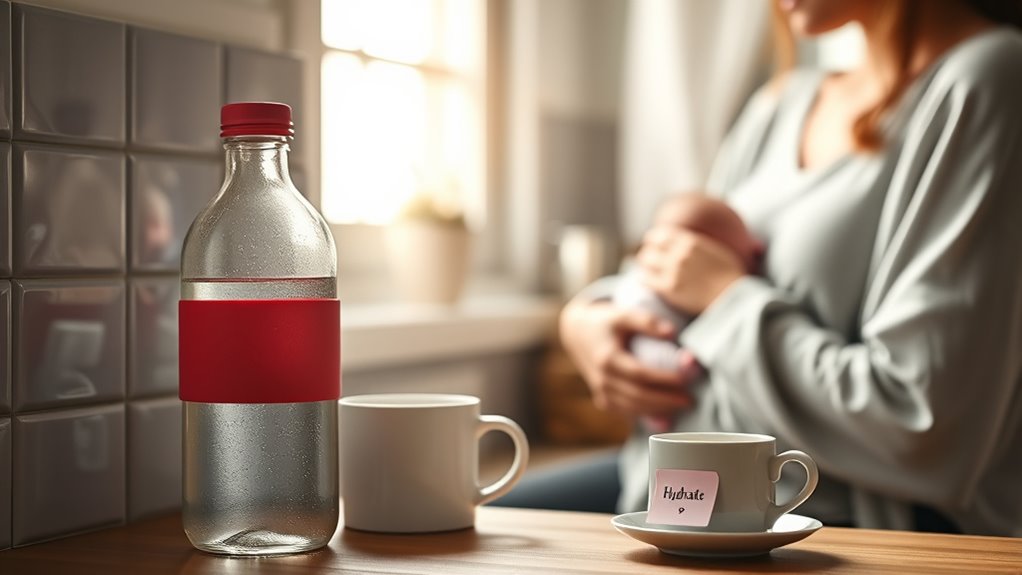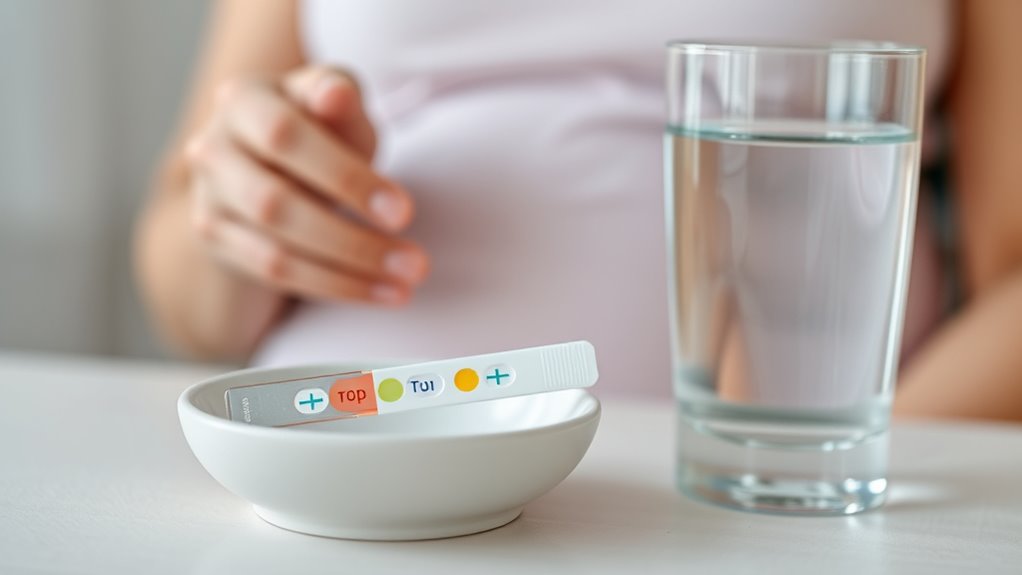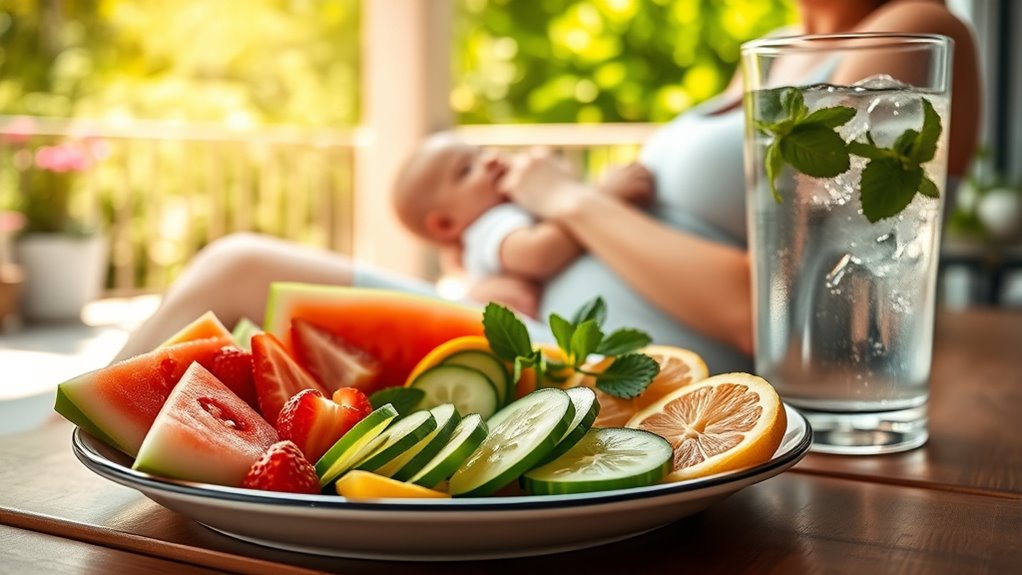To stay well-hydrated while breastfeeding, drink water before, during, and after nursing, and keep a water bottle nearby. Incorporate water-rich foods like fruits and vegetables into your meals, and set reminders to sip fluids regularly. Watch for signs of dehydration like dark urine or dry mouth. Balancing drinks and snacks, limiting sugary beverages, and staying attentive to your body’s signals help maintain hydration. Keep going to discover more practical tips to support your health and your baby.
Key Takeaways
- Monitor urine color and thirst cues to ensure proper hydration for milk production and overall health.
- Incorporate water-rich foods like fruits and vegetables to boost fluid intake naturally.
- Drink fluids strategically before, during, and after breastfeeding sessions to support hydration and milk supply.
- Set reminders using alarms or visual cues to develop consistent hydration habits throughout the day.
- Keep a water bottle handy and track daily intake to prevent dehydration and maintain energy levels.
Recognize Your Hydration Needs During Breastfeeding

Understanding your hydration needs while breastfeeding is essential because your body uses extra fluids to produce milk. You’ll notice that your thirst increases, signaling when you need to drink more. Pay attention to your body’s cues—thirst, dark urine, and dry mouth are clear signs you’re not drinking enough. While individual needs vary, a general guideline is to aim for about 13 cups (3.8 liters) of fluids daily. Keep in mind that your hydration needs can fluctuate based on activity level, climate, and breastfeeding frequency. Regularly check your hydration status by observing your urine color; light yellow indicates proper hydration. Staying attuned to these signals helps guarantee you meet your body’s demands, supporting both your health and your baby’s nourishment. Incorporating adequate hydration in education practices can also help you stay consistent with your fluid intake.
Incorporate Water-Rich Foods Into Your Diet

Including water-rich foods in your diet is a simple way to boost hydration. Fruits like watermelon, strawberries, and oranges, along with vegetables such as cucumbers and lettuce, help keep you hydrated throughout the day. Adding these to your meals makes staying refreshed easier and more enjoyable. Incorporating aquatic exercise into your routine can also complement your hydration efforts by promoting overall health.
Fruits With High Water Content
Fruits with high water content are an excellent way to boost hydration, especially for breastfeeding mothers who need extra fluids. Water-rich fruits like watermelon, strawberries, cantaloupe, and grapefruit provide hydration along with essential nutrients and natural sugars. These fruits are easy to incorporate into your daily diet, whether as a snack, in smoothies, or as part of a fruit salad. They help replenish fluids lost through breastfeeding and keep you feeling refreshed. Plus, they offer vitamins, antioxidants, and fiber that support your overall health. Including a variety of these fruits ensures you stay well-hydrated while enjoying delicious flavors. Remember, combining water-rich fruits with other hydrating foods can make a noticeable difference in your daily fluid intake. Additionally, choosing fruits that align with Hyundai Tuning concepts like enhancing performance and efficiency can inspire creative ways to incorporate nutritious, water-rich foods into your meals.
Hydrating Vegetables to Eat
Since vegetables are naturally high in water content, incorporating them into your meals is an effective way to stay hydrated. Leafy greens like lettuce, spinach, and arugula are excellent choices, adding moisture and nutrients to salads and sandwiches. Cucumber is especially hydrating, perfect for snacking or adding to dishes. Celery offers crunch and hydration, making it a great snack or ingredient in soups. Bell peppers and zucchini are versatile and contain plenty of water, boosting your fluid intake when roasted, grilled, or raw. Tomatoes, whether fresh or cooked, also contribute notably to hydration. Including these vegetables in your daily meals helps you stay refreshed and supports your breastfeeding journey by maintaining your hydration levels naturally. Proper food safety practices when handling and preparing vegetables are essential to prevent contamination and keep your meals safe.
Set Reminders to Drink Throughout the Day

Setting reminders helps you stay consistent with your hydration throughout the day. Use alarm clocks, track your daily intake, or place visible notes to prompt yourself. These simple tricks guarantee you don’t forget to drink, especially during busy moments. Being aware of your flushing habits can also help in maintaining proper hydration and bathroom routines.
Use Alarm Clocks
Using alarm clocks or reminder apps can be an effective way to guarantee you stay hydrated throughout the day. Set alarms at regular intervals, like every hour or two, to prompt you to drink water. This helps you develop a consistent drinking routine, especially when you’re busy or distracted. Choose sounds or notifications that catch your attention without being disruptive. When an alarm goes off, take a moment to drink a glass of water or a healthy beverage. Over time, these reminders will make staying hydrated feel automatic, reducing the chance of forgetting. Remember, consistency is key. Using alarms keeps hydration on your mind and ensures you meet your daily fluid needs, supporting both your health and your baby’s. Lifestyle habits like regular hydration are essential for overall well-being, especially during breastfeeding.
Track Daily Intake
Keeping track of your daily fluid intake can substantially boost your hydration efforts. When you monitor how much you drink, you stay aware of your hydration levels and can identify if you’re falling behind. Use a water tracking app, a journal, or a simple checklist to log every glass or bottle. This habit helps you set realistic goals and prevents dehydration, which can affect your energy and milk supply. Aim to record your intake consistently throughout the day, especially during busy moments or when you’re feeling thirsty. By paying attention to your hydration habits, you’ll be more proactive in meeting your fluid needs, ensuring both you and your baby stay healthy and well-hydrated. Incorporating hydration-oriented Kia Tuning techniques, such as setting reminders, can make it easier to stay on track.
Place Reminders Visible
Since it’s easy to forget to drink water during busy or distracted moments, placing reminders in visible spots can prompt you to stay hydrated. Use sticky notes on your mirror or fridge, or set alarms on your phone. These cues keep hydration top of mind throughout the day. To help you stay consistent, try this simple approach:
| Reminder Method | Best Locations |
|---|---|
| Phone alarms | Bedroom, living room, bathroom |
| Sticky notes | Mirror, fridge, workspace |
| Calendar alerts | Digital or paper planners |
| Smart home devices | Echo, Google Home, or similar |
| Visual cues | Water bottle, snack station |
Additionally, incorporating protective styling benefits like crochet locs can make your hydration routine more manageable by reducing hair manipulation during busy days.
Keep a Water Bottle Handy at All Times

Carrying a water bottle with you guarantees you stay hydrated throughout the day, especially when you’re busy caring for your baby. Having water within arm’s reach makes it easy to sip frequently and meet your hydration needs. Plus, it encourages you to drink more without thinking twice. To make it even more effective, choose a bottle you enjoy using—perhaps with a straw or a fun design. Keep it in places you visit often, like your diaper bag, stroller, or desk. Staying consistent with this habit prevents dehydration and boosts your energy levels. Remember, staying well-hydrated helps you recover faster and keeps your milk supply steady. Incorporating a hydration habit into your daily routine ensures you stay nourished and energized.
Balance Beverages With Nutritious Liquids

While drinking plenty of water is essential, it’s equally important to balance your fluids with nutritious beverages that support your health and milk production. Incorporate drinks like herbal teas, milk, and natural fruit juices to diversify your hydration. These options provide essential nutrients and can help prevent boredom from plain water. Be mindful of added sugars in some beverages, and choose whole, minimally processed options whenever possible. To help you decide, here’s a quick guide:
| Beverage Type | Benefits | Tips |
|---|---|---|
| Herbal Teas | Hydrating, soothing, caffeine-free | Avoid adding sugar |
| Milk | Calcium, protein | Choose low-fat options |
| Fresh Fruit Juices | Vitamins, antioxidants | Limit intake to prevent excess sugar |
| Coconut Water | Electrolytes, natural hydration | Opt for unsweetened varieties |
| Broth/Soup | Hydrating, nourishing | Prefer low-sodium options |
Additionally, some herbal teas like ginger lemon tea can offer soothing benefits while supporting hydration.
Monitor Your Urine Color as a Hydration Indicator

Monitoring your urine color offers a simple, effective way to gauge if you’re staying properly hydrated. When your urine is light yellow or straw-colored, it typically indicates good hydration. Darker urine suggests you might need to drink more fluids, while clear urine could mean you’re overhydrated. Pay attention to these signs to adjust your fluid intake accordingly. Remember, factors like medications, diet, and activity level can influence urine color, so use it as a general guide rather than an absolute measure. To get accurate insights, try to check your urine color regularly throughout the day. Staying aware helps ensure you’re maintaining ideal hydration, supporting your health and your baby’s well-being.
Monitoring urine color helps ensure proper hydration and supports your health and your baby’s well-being.
- Urine color varies based on hydration levels and other factors
- Consistently dark urine might signal dehydration
- Clear urine can indicate overhydration or excess fluid intake
Drink Before, During, and After Nursing Sessions

To stay well-hydrated, it’s important to drink before, during, and after nursing sessions. Timing helps guarantee your body maintains ideal fluid levels, making breastfeeding easier. Choose hydrating beverages like water or herbal tea to support both you and your baby.
Timing Is Key
Timing your hydration around breastfeeding sessions can make a significant difference in maintaining your milk supply and staying comfortable. Drinking fluids at the right times *guarantees* your body stays well-hydrated when you need it most. Aim to sip water:
- 10-15 minutes before nursing to prime your body
- During your feeding session to stay replenished
- Immediately after to support ongoing hydration needs
This approach helps prevent dehydration, which can reduce milk production and cause fatigue. Consistently timing your fluids helps your body adjust naturally, making breastfeeding easier and more comfortable. Remember, your body responds best when hydration is strategic rather than sporadic. Staying attentive to your timing can boost your milk supply and keep you feeling energized throughout your breastfeeding journey.
Choose Hydrating Beverages
Choosing the right beverages around your breastfeeding sessions can considerably impact your hydration and milk supply. Opt for water as your main drink, sipping it before, during, and after nursing. Herbal teas like chamomile or ginger can also be soothing and hydrating without caffeine. Limit sugary drinks and sodas, as they can cause dehydration and don’t support milk production. Coconut water is a natural option rich in electrolytes, helping replenish minerals lost through breastfeeding. Keep a water bottle nearby to remind yourself to stay hydrated consistently. If you’re feeling thirsty, drink more; don’t wait until you’re dehydrated. Remember, staying well-hydrated with nourishing beverages ensures you maintain your energy and supports your milk supply effectively.
Choose Hydrating Snacks to Boost Fluid Intake

Opting for hydrating snacks is an effective way to increase your fluid intake while satisfying your hunger. These snacks not only keep you refreshed but also contribute to your daily hydration goals. Fresh fruits like watermelon and oranges are high in water content and easy to grab on the go. Veggies such as cucumber and celery offer crunch and hydration without extra calories. Yogurt and smoothies provide a creamy, nourishing way to boost fluids and nutrients simultaneously. Incorporate these into your routine to stay energized and well-hydrated.
- Water-rich fruits like watermelon and berries
- Crisp vegetables such as cucumber and celery sticks
- Yogurt, smoothies, or flavored water with fruit slices
Limit Caffeine and Sugary Drinks

Caffeine and sugary drinks might seem like quick solutions for boosting energy, but consuming them in excess can negatively affect your hydration and overall health. Caffeine acts as a diuretic, which can make you lose more fluids, leading to dehydration. Sugary drinks, on the other hand, often contain empty calories that don’t contribute to hydration and can cause blood sugar spikes. Relying heavily on these beverages can also interfere with your sleep and leave you feeling more tired. Instead, opt for water, herbal teas, or infused water to stay properly hydrated. Limiting your intake of caffeine and sugary drinks helps maintain your fluid balance, supports your energy levels, and benefits your overall health, especially during the demanding breastfeeding months.
Pay Attention to Signs of Dehydration

While limiting caffeine and sugary drinks helps prevent dehydration, it’s equally important to recognize the physical signs your body gives when it’s not getting enough fluids. Dehydration can sneak up on you, especially during breastfeeding when your body needs extra hydration. Pay attention to symptoms like dark urine, dry mouth, and feeling unusually tired or dizzy. Thirst is a clear sign, but don’t ignore less obvious cues. Staying alert to these signals helps you respond quickly, ensuring both your health and your baby’s well-being. Remember, early detection can prevent more serious issues, so listen to your body and hydrate regularly. Being proactive keeps you feeling energized and supports your breastfeeding journey smoothly.
- Dark-colored urine
- Feeling lightheaded or dizzy
- Dry, sticky mouth
Frequently Asked Questions
Can Certain Foods Improve Hydration for Breastfeeding Moms?
You might wonder if specific foods can boost your hydration while breastfeeding. Yes, incorporating water-rich foods like watermelon, cucumbers, oranges, strawberries, and lettuce can help. These foods provide extra fluids and nutrients, making staying hydrated easier. Pair them with plenty of water and herbal teas to maintain your hydration levels. Eating a balanced diet with hydrating foods supports your milk production and keeps you feeling energized.
How Does Breastfeeding Affect My Daily Water Needs?
Did you know that breastfeeding can increase your daily water needs by about 25%? When you nurse, your body uses extra fluids to produce milk, making hydration essential. You should aim to drink an additional 16-24 ounces of water daily beyond your usual intake. Staying well-hydrated supports milk production and keeps you energized, so listen to your thirst cues and drink consistently throughout the day.
Are Herbal Teas Safe for Increasing Hydration?
Herbal teas can be a safe way to increase your hydration, but you should choose caffeine-free options and avoid those with herbs that might affect milk production or safety. Always check ingredients and consult your healthcare provider before adding new teas to your routine. Drinking herbal teas can be comforting and flavorful, helping you stay well-hydrated, especially if you find plain water boring. Just remember to enjoy them in moderation.
What Are Natural Signs of Overhydration in Breastfeeding Mothers?
Overhydration can sneak up on you like a quiet wave. You might notice swelling in your hands or feet, a headache that persists, or feeling overly bloated. Clear, excessive urination or a sense of confusion also signal you’re drinking too much. Trust your body’s signals; if they scream for help, cut back on fluids. Staying balanced is key to keeping both you and your baby healthy.
Does Hydration Influence Milk Supply Quality and Quantity?
Hydration definitely affects your milk supply, both in quantity and quality. When you drink enough water, your body can produce milk more efficiently, ensuring your baby gets enough nourishment. On the other hand, dehydration can lead to a decrease in milk production and may impact the nutrient content. So, by staying well-hydrated, you support ideal milk production, helping your baby thrive and ensuring both of you stay healthy.
Conclusion
Just like a plant needs water to flourish, your body relies on proper hydration to support both you and your baby. When I first started breastfeeding, I noticed my energy dip, and I realized I wasn’t drinking enough. Since then, staying hydrated has become my secret weapon—helping me feel more energized and confident. Remember, keeping yourself well-hydrated is the foundation that allows you to nurture your little one with strength and love.









